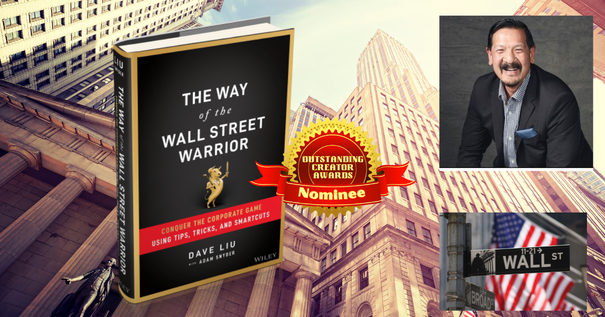|
Score: 96/100 (9.6 out of 10)
The Way of the Wall Street Warrior by Dave Liu might be the funnest, funniest, most entertaining business book we've ever read! If Bacon Grief didn't exist, it could've been the funniest book we've ever reviewed. If The Value Equation didn't exist, it could've won the non-fiction category outright. It's looking more like it might tie. Dave Liu just gets it. He is hilarious. We can't say that enough. He made us laugh constantly. His writing is so sharp, so sarcastic, and so biting. There's also something very conversational about his writing style. For example, he'll say things like “I know, I know... 'boo-hoo'” and “become rich and respected like Salmon and Lehman—or not” (revealing in the footnotes that the Salomon and Lehman brothers are not so respected anymore). He'll even say things like, to paraphrase, “You have no problems and have everything figured out? Well, congratulations, you must be Jesus! You can return this book now.” Yet, despite the humor, there's still weight in everything he says. Dave Liu is a very intelligent and successful person, and it shows through his clever writing and the advice therein. For starters, this book is filled to the brim with practical and useful psychological concepts like recency bias, Pygmalion effect, parlay, and the seersucker illusion. There are dozens, possibly over a hundred of these concepts. So, this book is rich with interesting, helpful, and educational content. Let's just look at three of these dozens of concepts. The Pygmalion effect is the idea that a person's high expectations lead to improved importance. The idea of the parlay is that good things can lead to a snowballing effect of good things. Growth and success becomes exponential. The seersucker illusion is the fallacy (error) that a guru's advice or the information they supply is to be taken as gospel 100% of the time. The truth is, even the best in their fields—the so-called “experts”—make mistakes from time to time. From what we gathered, the author seems to put forward the idea that the warriors of Wall Street & the super wealthy are not actually royalty—people to be held to a much standard above and beyond the rest of us plebeians—they're actually very flawed humans like the rest of us, guided by human instincts and drives, particularly self-serving, self-centered ones like greed. The author appears to have a harshly realistic, pseudo-Machiavellian view of society and business. People aren't out to get you, necessarily, but there's a strong likelihood that they're looking out for themselves (possibly at your expense). So, watch your back. It's like Stone Cold Steve Austin said, “Don't trust anybody.” That doesn't mean to be a jerk about things, it just means to watch your back and cover your butt. If you think there's a chink or hole in your armor or an error in something you've done, make sure your enemies or potential enemies can't take advantage of it. That could mean scrubbing your social media accounts clean with the expectations that they might dig up dirt about you. There's another very subtle yet interesting concept in here, and that's managing the narrative surrounding you. What people think about you matter. Your reputation matters, but your reputation is largely something you can manipulate with some time and effort. The best example the author gives is of Alfred Nobel, the man for whom the Nobel Peace Prize is named after. Despite being largely associated with “peace” now, Alfred Nobel invented dynamite, eventually having a large role in selling/distributing explosives and weapons as an arms dealer. The author rather humorously points out that Nobel had a sudden change of heart about selling weapons that likely killed thousands of people and is now known for championing peace and technologies that help people. That, according to the author, is because he was tactful and skillful enough to manage (or manipulate) his narrative. History is written by the victors, so don't lose. And if you lose, make sure as few people as possible know or care about it. See, he's got us thinking a bit like him! As far as critiques, there are occasional small inconsistencies in grammar. For example, periods and commas occur inside or outside of parentheses intermittently, sometimes in the same paragraph. The really glaring problem that kept reoccurring was the text in the graphics. They're very cute and funny graphics, however, the text is often difficult to read in black & white. Because the speech bubbles are sometimes dark, the text literally blends into them. So, while we assume some of these cartoons had funny, clever punchlines, we couldn't see all of them. However, just the fact that the author put effort into making these cartoons is commendable. Dave Liu himself seems to be a fascinating and inspirational person. Not only was he born an Asian minority, but he was born with a cleft lip. This is a condition that isn't only cosmetic, it is actually deadly in some third-world countries because it makes it difficult or impossible for children to eat and drink. Despite the challenge of looking different, being different, and being treated different, the author was still able to become successful. According to Liu, he helped raise over $15 billion for hundreds of businesses as a 30-year veteran of Wall Street & Silicon Valley! This would effectively make us one of at least two millionaires/billionaires who've come through our contests. We feel richer by association alone! Check this out on Amazon! Maybe you'll come away richer (or feeling richer) too!
0 Comments
Leave a Reply. |
Archives
July 2024
Categories |

 RSS Feed
RSS Feed